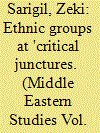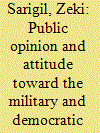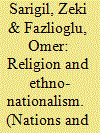|
|
|
Sort Order |
|
|
|
Items / Page
|
|
|
|
|
|
|
| Srl | Item |
| 1 |
ID:
105685


|
|
|
| 2 |
ID:
088939


|
|
|
|
|
| Publication |
2009.
|
| Summary/Abstract |
Why is the military so popular in Turkish society? By using World Values Survey data, this study explores the impact of several political, social, and personal factors on societal confidence in the military. Empirical results indicate that there is a significant variance in confidence in the military across certain political groups. Although the military's popularity is high among nationalists, it is rather limited among pro-Islamic and pro-Kurdish groups. Interestingly, however, religion cuts both ways in the formation of confidence in the military. Pro-Islamic groups do not have much confidence in the strictly secular military, but being a devout Muslim does not reduce the military's popularity. Another interesting finding is that trust in civilians and support for democracy do not necessarily reduce military's popularity. A brief discussion of some implications of these findings for the civil-military relations and prospects for the consolidation of democracy in the Turkish Republic is also provided.
|
|
|
|
|
|
|
|
|
|
|
|
|
|
|
|
| 3 |
ID:
111240


|
|
|
| 4 |
ID:
180198


|
|
|
|
|
| Summary/Abstract |
The unit of analysis in almost all large-N studies on conflict contagion and diffusion is collective actors, such as states and ethnic groups or movements. Thus, contagion dynamics and processes at the individual level have been neglected. Using original data derived from a public opinion survey, this study examines the micro-level dynamics of contagion in the context of Turkey’s Kurdish conflict. The study suggests that transnational ethnic ties, and in particular, cross-border familial bonds and interactions, facilitate conflict contagion through several strategic and ideational mechanisms. First, transborder familial ties and interactions amplify the demonstration effect of ethnic-kin achievements in contiguous conflict countries. Second, cross-border familial bonds facilitate collaboration between cross-border co-ethnics. Finally, such ties to conflict zones with ethnic kin groups empower pan-ethnic identities. The empirical findings show that Kurds living in Turkey who have close relatives in nearby countries hosting conflicting ethnic-kin groups (i.e. Syria, Iraq, and Iran) have stronger ethnonationalist orientations and claims against the center. However, having close relatives elsewhere (e.g. Europe) does not generate the same impact. The Kurdish case evidences that contagion processes and dynamics might vary substantially across the members of a particular ethnic group. Hence, it is necessary to broaden the conventional focus on collective actors in conflict contagion research and pay greater attention to micro-level variables and factors.
|
|
|
|
|
|
|
|
|
|
|
|
|
|
|
|
| 5 |
ID:
138759


|
|
|
|
|
| Summary/Abstract |
The political influence of the Turkish military has substantially declined in the last decade, triggered by the European Union’s decision during the Helsinki Summit in 1999 to grant candidacy status to Turkey. This study illuminates Turkey’s democratization process in the post-Helsinki period by empirically analyzing a relatively underinvestigated aspect of civil–military relations: public opinion and attitude toward the military and civil–military issues. Empirical analyses, based on original and comprehensive public opinion data, indicate that despite impressive reforms and improvements in the legal and institutional structures in Turkish civil–military relations in the past ten years, democratic transformation in the political culture has been lagging behind. This gap is likely to complicate democratization process in Turkey. The article also provides a discussion of broader theoretical and practical implications of empirical findings.
|
|
|
|
|
|
|
|
|
|
|
|
|
|
|
|
| 6 |
ID:
121874


|
|
|
|
|
| Publication |
2013.
|
| Summary/Abstract |
One approach within the Islamic camp treats Islam, which emphasizes overarching notions such as the 'Islamic brotherhood' and 'ummah', as incompatible with ethno-nationalist ideas and movements. It is, however, striking that in the last decades, several Islamic and conservative groups in Turkey have paid increasing attention to the Kurdish issue, supporting their ethnic demands and sentiments. Even more striking, the leftist, secular Kurdish ethno-nationalists have adopted a more welcoming attitude toward Islam. How can we explain such intriguing developments and shifts? Using original data derived from several elite interviews and a public opinion survey, this study shows that the struggle for Kurdish popular support and legitimacy has encouraged political elites from both camps to enrich their ideological toolbox by borrowing ideas and discourses from each other. Further, Turkish and Kurdish nationalists alike utilize Islamic discourses and ideas to legitimize their competing nationalist claims. Exploring such issues, the study also provides theoretical and policy implications.
|
|
|
|
|
|
|
|
|
|
|
|
|
|
|
|
| 7 |
ID:
127815


|
|
|
|
|
| Publication |
2014.
|
| Summary/Abstract |
One of the defining features of Turkish politics has been the strong influence of the military in civilian politics. However, since the early 2000s, we have seen unprecedented developments, substantially constraining the political powers of the military. How can we interpret this period from a historical perspective? What are the continuities and discontinuities in Turkish civil-military relations? Do these developments mark the end of military guardianship in the country? Employing the principal-agent framework, this study shows that the path of Turkish civil-military relations has been cyclical, where the status of the military has swung between agent and principal. Such swings have led to a significant degree of variance in the nature of the military guardianship. Thus, this study identifies two distinct stages of military tutelage during the Republican period: symbolic (1924-1960) and overt/assertive (1960-2001). It is further argued that the recent reversion of the military back to agent of the civilian principals has initiated a post-guardianship era in Turkey.
|
|
|
|
|
|
|
|
|
|
|
|
|
|
|
|
|
|
|
|
|